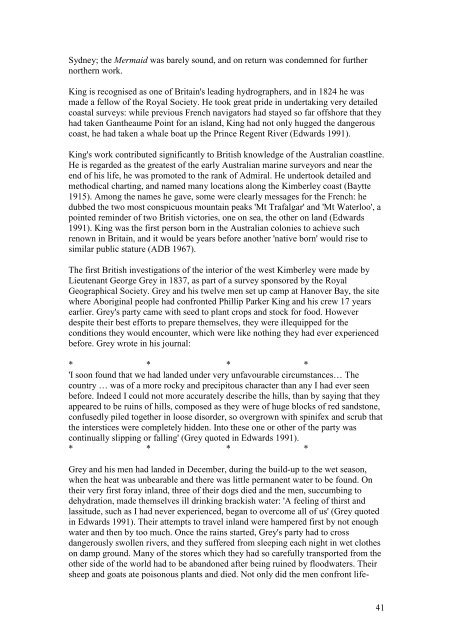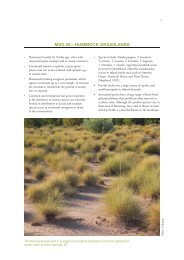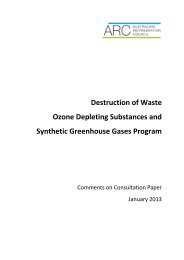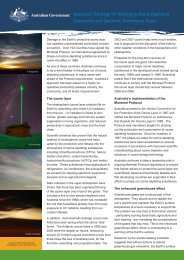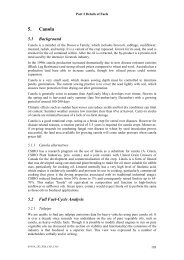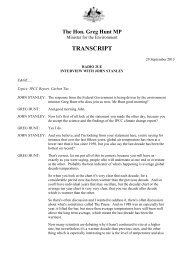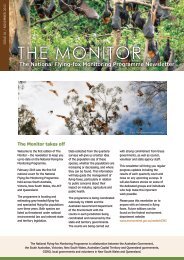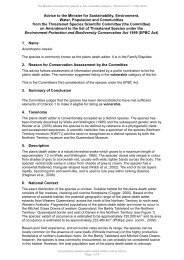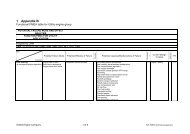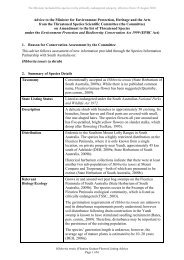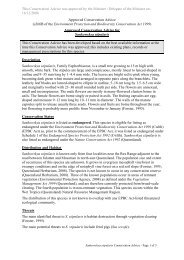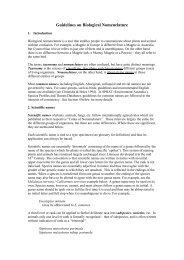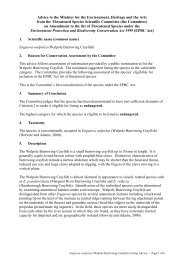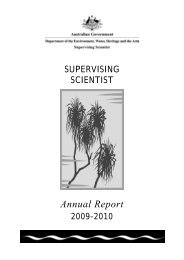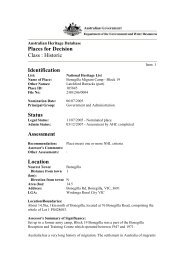WEST KIMBERLEY PLACE REPORT - Department of Sustainability ...
WEST KIMBERLEY PLACE REPORT - Department of Sustainability ...
WEST KIMBERLEY PLACE REPORT - Department of Sustainability ...
Create successful ePaper yourself
Turn your PDF publications into a flip-book with our unique Google optimized e-Paper software.
Sydney; the Mermaid was barely sound, and on return was condemned for further<br />
northern work.<br />
King is recognised as one <strong>of</strong> Britain's leading hydrographers, and in 1824 he was<br />
made a fellow <strong>of</strong> the Royal Society. He took great pride in undertaking very detailed<br />
coastal surveys: while previous French navigators had stayed so far <strong>of</strong>fshore that they<br />
had taken Gantheaume Point for an island, King had not only hugged the dangerous<br />
coast, he had taken a whale boat up the Prince Regent River (Edwards 1991).<br />
King's work contributed significantly to British knowledge <strong>of</strong> the Australian coastline.<br />
He is regarded as the greatest <strong>of</strong> the early Australian marine surveyors and near the<br />
end <strong>of</strong> his life, he was promoted to the rank <strong>of</strong> Admiral. He undertook detailed and<br />
methodical charting, and named many locations along the Kimberley coast (Baytte<br />
1915). Among the names he gave, some were clearly messages for the French: he<br />
dubbed the two most conspicuous mountain peaks 'Mt Trafalgar' and 'Mt Waterloo', a<br />
pointed reminder <strong>of</strong> two British victories, one on sea, the other on land (Edwards<br />
1991). King was the first person born in the Australian colonies to achieve such<br />
renown in Britain, and it would be years before another 'native born' would rise to<br />
similar public stature (ADB 1967).<br />
The first British investigations <strong>of</strong> the interior <strong>of</strong> the west Kimberley were made by<br />
Lieutenant George Grey in 1837, as part <strong>of</strong> a survey sponsored by the Royal<br />
Geographical Society. Grey and his twelve men set up camp at Hanover Bay, the site<br />
where Aboriginal people had confronted Phillip Parker King and his crew 17 years<br />
earlier. Grey's party came with seed to plant crops and stock for food. However<br />
despite their best efforts to prepare themselves, they were illequipped for the<br />
conditions they would encounter, which were like nothing they had ever experienced<br />
before. Grey wrote in his journal:<br />
* * * *<br />
'I soon found that we had landed under very unfavourable circumstances… The<br />
country … was <strong>of</strong> a more rocky and precipitous character than any I had ever seen<br />
before. Indeed I could not more accurately describe the hills, than by saying that they<br />
appeared to be ruins <strong>of</strong> hills, composed as they were <strong>of</strong> huge blocks <strong>of</strong> red sandstone,<br />
confusedly piled together in loose disorder, so overgrown with spinifex and scrub that<br />
the interstices were completely hidden. Into these one or other <strong>of</strong> the party was<br />
continually slipping or falling' (Grey quoted in Edwards 1991).<br />
* * * *<br />
Grey and his men had landed in December, during the build-up to the wet season,<br />
when the heat was unbearable and there was little permanent water to be found. On<br />
their very first foray inland, three <strong>of</strong> their dogs died and the men, succumbing to<br />
dehydration, made themselves ill drinking brackish water: 'A feeling <strong>of</strong> thirst and<br />
lassitude, such as I had never experienced, began to overcome all <strong>of</strong> us' (Grey quoted<br />
in Edwards 1991). Their attempts to travel inland were hampered first by not enough<br />
water and then by too much. Once the rains started, Grey's party had to cross<br />
dangerously swollen rivers, and they suffered from sleeping each night in wet clothes<br />
on damp ground. Many <strong>of</strong> the stores which they had so carefully transported from the<br />
other side <strong>of</strong> the world had to be abandoned after being ruined by floodwaters. Their<br />
sheep and goats ate poisonous plants and died. Not only did the men confront life-<br />
41


